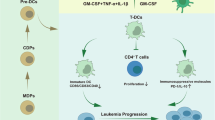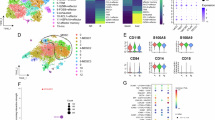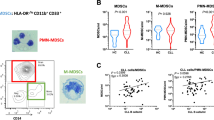Abstract
Several myeloid leukemia-derived cells have been reported to possess the ability to differentiate into dendritic cells (DC). MUTZ-3, a myeloid leukemia cell line, responds to GM-CSF, IL-4 and TNF-α, and acquires a phenotype similar to immature monocyte-derived DC (MoDC). In the present study, MUTZ-3-derived DC (MuDC) showed high level expression of HLA class II molecules, CD80 and CD86, and were able to function as potent antigen presenting cells as previously reported. Interestingly, MuDC maturation was induced by CD40-mediated stimulation, but not by LPS stimulation. We analyzed CCR1, CCR7 and Toll-like receptor (TLR) expressions in MuDC, and measured IL-10 and IL-12 production after maturation stimuli. Although MuDC expressed the mRNA for TLR4, a major component of the LPS receptor system, they did not show an enhanced level of CCR7 or cytokine production after LPS stimulation. In contrast, they responded to CD40 stimulation, which resulted in increased levels of CD83, CD86 and CCR7. Moreover, while LPSstimulated MoDC could potently stimulate NK cells in a DC-NK cell co-culture, LPS-stimulated MuDC failed to stimulate primary NK cells. Taken together, our findings suggest that, although MuDC express TLR4, unlike TNF-α and IL-1β, LPS does not stimulate MuDC to acquire mature phenotypes, and they may have impaired activity to initiate innate immune response.
Similar content being viewed by others
Article PDF
Author information
Authors and Affiliations
Rights and permissions
This is an Open Access article distributed under the terms of the Creative Commons Attribution Non-Commercial License (http://creativecommons.org/licenses/by-nc/3.0/) which permits unrestricted non-commercial use, distribution, and reproduction in any medium, provided the original work is properly cited.
About this article
Cite this article
Kim, K., Choi, SC., Noh, YW. et al. Impaired responses of leukemic dendritic cells derived from a human myeloid cell line to LPS stimulation. Exp Mol Med 38, 72–84 (2006). https://doi.org/10.1038/emm.2006.9
Published:
Issue date:
DOI: https://doi.org/10.1038/emm.2006.9
Keywords
This article is cited by
-
Human leukocyte antigen class II quantification by targeted mass spectrometry in dendritic-like cell lines and monocyte-derived dendritic cells
Scientific Reports (2021)
-
Ganoderma lucidum polysaccharides can induce human monocytic leukemia cells into dendritic cells with immuno-stimulatory function
Journal of Hematology & Oncology (2008)



